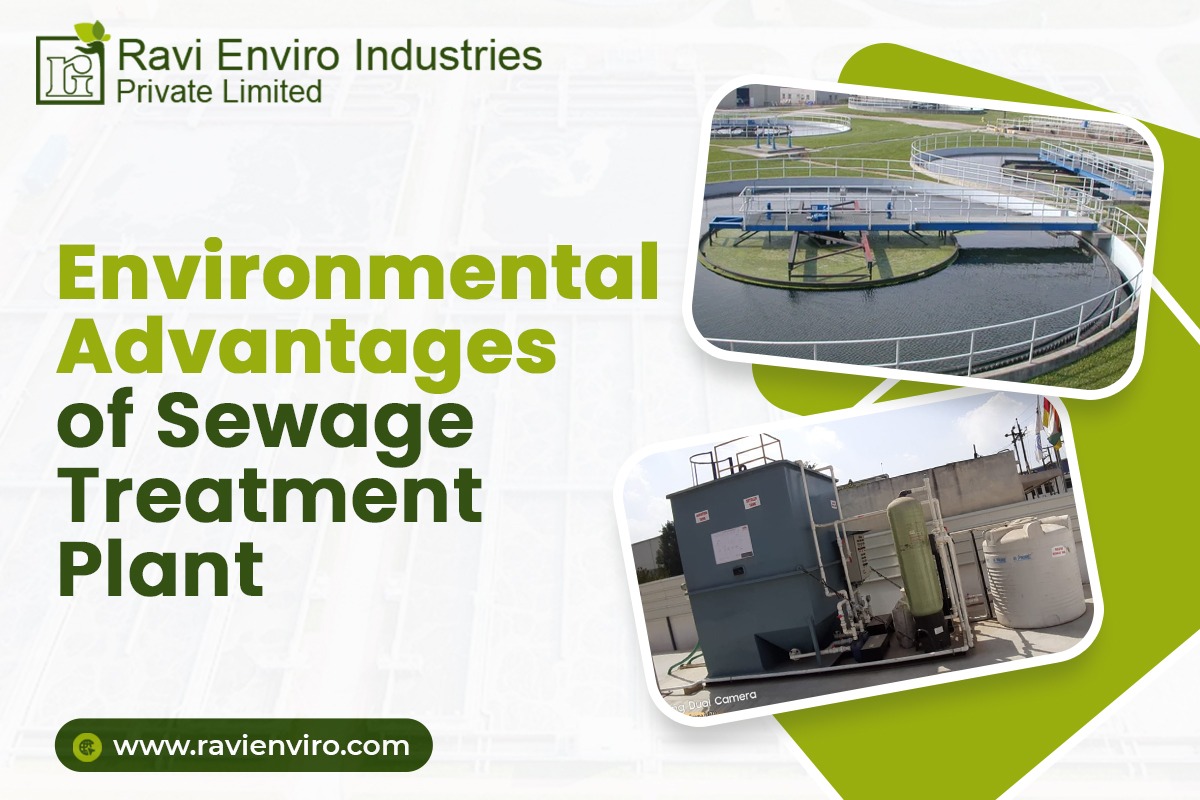
- May 15, 2024
- Ravi Enviro
- STP
- 0 Comments
Sewage is a major cause of concern for countries across the globe. It comprises harmful contaminants that pose a health hazard and contributes to environmental pollution. STP plants play a pivotal role in safeguarding the ecosystem by treating the wastewater before it is released into water bodies or land. STP plant process includes biological, chemical, and physical processes to remove suspended solids and other contaminants from the wastewater. In this blog, we explore the various environmental advantages of sewage treatment plant that shed their importance for the environment and industries.
What is a Sewage Treatment Plant?
A sewage treatment plant or STP plant is a system that is specially designed to treat wastewater from different establishments, such as domestic and commercial sources. It removes harmful contaminants that could pose a threat to the environment and humans. The first step of the STP plant treatment process involves removing larger suspended particles through settling tanks and screens.
Later, the chemical is added to separate smaller particles from the wastewater. Next, microorganisms like protozoa are introduced to break down the particles. Further, the water is disinfected using UV radiation and chlorination. Due to the various sewage treatment plant benefits, it is employed across different industries like pharmaceutical, dairy, sugar, chemical, textiles and other industries.
6 Advantages of Sewage Treatment Plant
#1 Eco-Friendly
Advanced STP plants protect that groundwater by discharging contaminant-free water into the water bodies. A well-functioning STP plant by leading sewage treatment plant manufacturers in India & like Ravi Enviro Industries Pvt. Ltd ensures an odorless and noise-free system that takes care of noise pollution and air pollution in the area.
#2 Saves Water
One of the primary sewage treatment plant advantages is that they promote the recycling of water. Recycling grey water (from sinks, laundry, showers, baths) and black water (from toilets) for watering plants or other purposes can contribute towards saving water and money.
#3 Minimizes Ground Pollution
Another important advantage of sewage treatment plant is that it helps to reduce ground pollution. In the STP process, the organic matter is converted into water, carbon dioxide and nitrogen. This ensures a safe disposal of wastewater and protects the ecosystem and wildlife.
#4 Energy Generation
The STP plants use anaerobic digestion to treat wastewater. This produces biogas and can be used as an energy source.
#5 Improves Water Quality
Another environmental advantage of a Sewage Treatment Plant is that it helps to improve the water quality. The STP plants treat the wastewater by removing the harmful contaminants before the treated water is discharged into the environment. This helps to maintain and improve the quality of the water bodies.
#6 Prevention of Environmental Contamination
STP plants help to prevent water-borne diseases and environmental contamination and contribute to public health.
Conclusion
Sewage Treatment plants play a pivotal role in protecting the environment, safeguarding overall public health, and promoting sustainable development. Its ability to effectively treat wastewater helps prevent water pollution, protect water bodies from harmful contaminants, and contributes to sustainability.
Ravi Enviro Industries Pvt. Ltd is a leading wastewater treatment manufacturer in India. Our range of STP plants is backed with MBBR/FBBR technology to safeguard the environment and improve safety. We have 49+ years of experience in STP plant development and offer maintenance services to our valued clients. To know about the technical specifications of our WWTP, contact us today.



